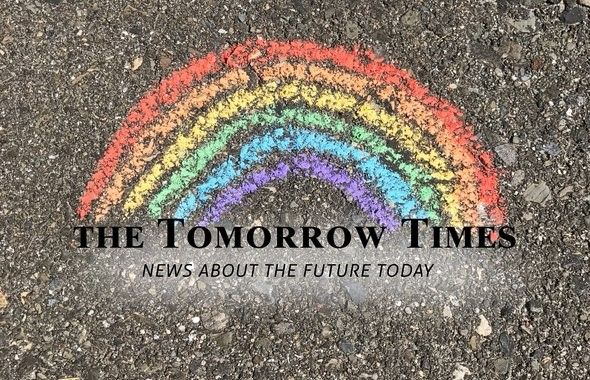The pandemic has forced us to stop and reflect on our lives, questioning the things most dear to us. It has made us remember that we cannot take everything for granted. The positive side is that the desire to rebuild healthy relationships with our planet is more alive than ever.
Latest happenings show us that people, companies, cities, and entire countries are moving forward, realizing the importance of this planet where we live, our only home. In this edition, we celebrate holistic approaches and examples of goodwill which show us that another economy and society is not only possible but already thriving. From regenerative agriculture that stores CO2 through inclusive cities that invest in nature-based solutions to systems which ensure health in low-income countries, all in this edition of the Tomorrow Times.
Stay curious, keep up to date, and get inspired, all in a quick read.
Follow these periodical monthly updates of tomorrow’s sustainability news today, by subscribing to the Tomorrow Times.
Energy & Environment

- A new marine sanctuary in the most remote inhabited archipelago in the world. Tristan da Cunha, a volcanic archipelago in the south Atlantic and part of the UK’s overseas territories, has announced that an area three times the size of Britain will become a marine protected area (MPA), the fourth largest such sanctuary in the world.
- Protecting land and animals will mitigate future pandemics. We are part of a wonderful system of life, a network of things, animals and people whose destiny is closely intertwined. The same forces driving extinction, habitat loss, and climate change will also lead to future pandemics, say an international group of scientists.
- The ‘new normal’ with palm oil agroforestry. This article reveals the wonders of palm oil and how it is a product rooted in the history of mankind for thousands of years. Yet palm oil has recently received much negative attention. As always, the plant is not to be blamed - it is the human factor that constitutes the problem. Best practices for oil palm in agroforestry are already happening, ready to scale-up.
Business & Economy

- Competitiveness, equality, and sustainability - the way forward. Ten years on from the global financial crisis, the world economy remains locked in a cycle of low or flat productivity growth despite the injection of more than $10 trillion by central banks. The latest Global Competitiveness Report paints a gloomy picture, yet it also shows that those countries with a holistic approach to socio-economic challenges, look set to get ahead in the race to the frontier.
- Plastics and the circular economy. In this interactive learning path, the Ellen Macarthur Foundation Discover guides you through some exciting innovations, making the concept of circular plastic so obvious that you will wonder “why it isn't so then”? You can also download a full guide to upstream innovation in the packaging industry.
- Five benefits of a circular economy for food. Today's food system can be fundamentally redesigned to actively tackle climate change and biodiversity loss, and promote human health while reducing the overall costs to society.
Science, Technology & Design

- Turning evidence into health impact. Norwegian Professors Jørn and Kristin Braa were awarded the 2020 Roux Prize. This sibling duo developed DHIS2, the world’s largest health information systems program, as a global public good to enable low and middle-income countries to use data to make public health decisions.
- The world's first in-store recycling system. Looop is now installed at H&M in Stockholm, turning old garments into new ones. In just eight steps, Looop shreds your old garment and knits a new one from the old fibres. No water, no dye.
- The entire water-companies sector set to zero-carbon in UK. The Net Zero 2030 Routemap sets out the industry’s vision for how water companies, which together produce almost a third of UK industrial and waste process emissions, will deliver net-zero carbon emissions by 2030. The world’s first sector-wide plan of its kind.
Urban Environment

- World Cities Day celebrates ‘Sustainability’. On World Cities Day UN-Habitat releases a report on the value of sustainable urbanization. “The world’s attention to the urgent need to prioritize sustainable urban planning and development of our cities and towns” - The World Cities Report 2020.
- Nature-based solutions for cities. The UrbanByNature programme, a ground-breaking initiative to empower local governments to build more resilient and sustainable cities through nature-based approaches, was launched in China, in cooperation with EU-funded projects.
- Cities that fly the rainbow flag are also the most innovative. Research published earlier this year has identified a strong correlation between innovation and LGBT+ inclusivity in the world's cities. But it’s not all about innovation. Cities hitting high results on LGBT+ were also those attracting entrepreneurs and global talent.
Unexpected and Intriguing

- A great call for action. In a talk backed by vivid animations, Johan Rockström shows how nine out of the 15 big biophysical systems that regulate the climate are at risk of reaching tipping points. A TED video part of the Countdown initiative to champion and accelerate solutions to the climate crisis, turning ideas into action.
- Italy accidentally invented the perfect Covid-era hotel. Since the 1990s, Italy has been pioneering a tourism model known as "albergo diffuso" or scattered hotel. These involve installing a full hotel into various buildings of a largely abandoned village which have suffered from depopulation. A perfect solution to enjoying a vacation in de social distancing era; at the same time a solution to the depopulation of rural villages.
- What Japan's future spaceport might look like? A team of Japanese architects, under the “Space Port Japan Association” (SPJ) banner, have designed a breathtaking concept for a futuristic, four-story spaceport, meant to float just off the shore in Tokyo Bay.
Have you seen a news item suited for 'the Tomorrow Times'? Let us know and we'll consider including it in the next edition.
Previous Tomorrow Times editions
Find all Tomorrow Times editions and newsletters here.
Dec. 2, 2020

